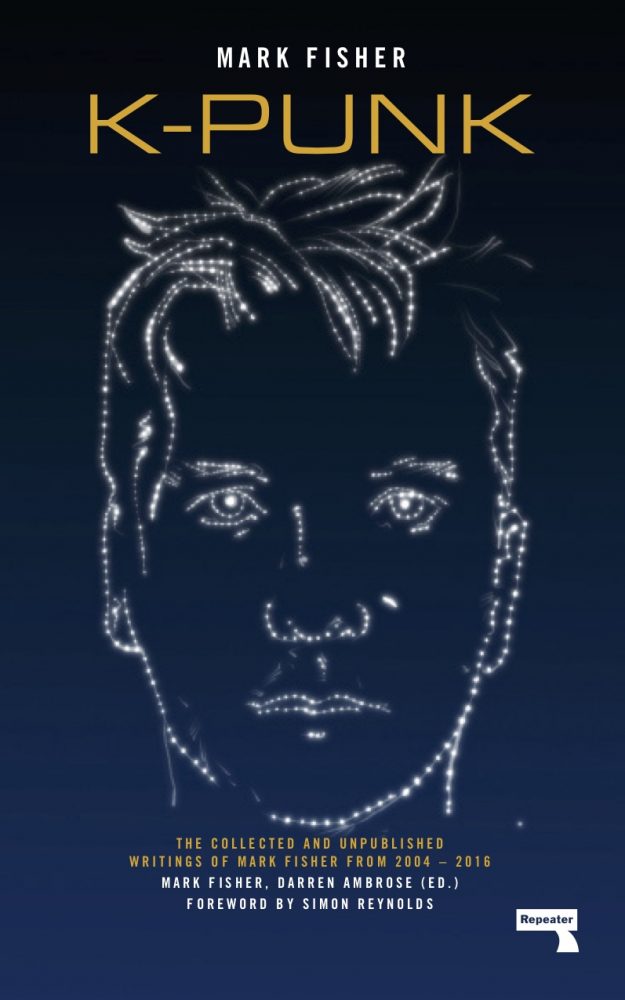Mark Fisher – Or how K-Punk intensifies the political possibilities of music

“K-Punk: The Collected and Unpublished Writings of Mark Fisher (2004-2016)”, edited by Darren Ambrose, Repeater Books, 2018 – Essay by Macon Holt.
Mark Fisher was the most important music critic of his generation. And in some ways, he continues to be so despite taking his own life over two years ago. I think one of the main reasons for this was that, for Mark, writing, and thinking about music was always the start of something; an opening up of new intensities, possibilities, and connections. Music was always already political, libidinal and affecting in excess of the niches of music culture to which it is so often relegated. Fisher had trained as a philosopher and is perhaps best known for his work as a cultural theorist but, despite spending his career in and out of the academy, he was never really at home with the practice of being the arbiter of what culture was worthy of canonization. This is not to say he wasn’t strident in his opinions, because he was and unabashedly so. Rather for Mark, as with his friend and sometime collaborator Kodwo Eshun, the role of the theorist or the critic of culture and music, was one of an “intensifier”. The task was to bring out the currents already present in the sounds that surrounded us rather than merely assessing their worth in accordance with abstracted theories of the sublime.
This is why the new collection of Mark’s previously unpublished posts from his blog, K-Punk, and other places over the last 12 years is so very valuable. It lets us see the connections between the music in our lives and the politics that shape them up close.
The name, K-Punk, was a nod to his involvement in the 1990s with the Cybernetic Cultures Research Unit [CCRU], with K serving as a stand-in for the ancient Greek word, Kuber, from which cyber is derived. CCRU was a group of students, lecturers, artists and writers who operated unofficially out of the philosophy department at the University of Warwick under the quasi-leadership of Nick Land and Sadie Plant. The group read the texts of French poststructuralism (Baudrillard, Deleuze and Guattari, Lyotard) and cyberpunk science fiction (Gibson, Dick, Ballard) like they were different frequencies on the same scale and purposely tried to blur any distinction further in their own enigmatic polemical texts. These were pieces of writing that tried to pull the post-human future we’d been promised into the present. Put simply, they saw their texts, and texts in general, as having a kind of force to them that could bring the ideas they contained into being in the future. This was the first wave of accelerationism, an idea that Mark would continue to experiment with up to and including the emergence of Xenofeminism. However, by the early 2000s the cyberculture dream seemed to have been utterly co-opted by the banalities of Silicon Valley commodity production, the CCRU had disbanded and Mark was looking for other sites of political potential in culture.
I should make clear from the start that I’m not unbiased in my assessment. Mark was my PhD supervisor at Goldsmiths, and his death fell between the submission of my thesis and its defense a couple of months later. During that strange examination, my examiners made clear to me something that I had not really acknowledged or perhaps even attempted to play down; my thesis was so much more haunted by Mark’s work than I had recognized. So, for the last year, I have been working on a book manuscript exploring one his most famous works, “Capitalist Realism” (2009), as it relates to contemporary pop music. This is to say that I do have a horse in this race. But it would have been difficult to dedicate so much time to someone’s work and ideas if I didn’t think there is something to them. The upshot of this is that I find it tricky to work out where to call him Mark and where to call him Fisher.
In his own account of things in “Ghosts of My Life” (2014), it was music that opened up philosophy for Fisher. Growing up at a time when music journalism in the UK was mutating into something closer to literary criticism, Fisher would read reviews of post-punk bands in the NME that would cite Derrida or Foucault to make a point. A far cry from what that publication is like today. But rather than take this as the voice of the great explainers coming in to categorize and reduce music to pre-developed concepts, for Fisher, it was instead the music that made these ideas work at all. This was the approach that he carried into his work years later.
One his most well known theoretical terms was hauntology, an idea reluctantly borrowed from Derrida, a thinker who’s “pathology of skepticism” Fisher had always found vexing. For Derrida, the term was based on the homophonic quality of the words ontology and hauntology in French. A pun that was used to argue that the study of what can be said to exist is always haunted by previous attempts at this project, which affect how we conduct it today. Fisher, however, wanted to take this concept further to encompass how expression in contemporary cultural production contained previous notions of possibility and potential that were now lost. In the negative, Fisher would point to a band like the Arctic Monkeys, whose early 80s indie pop reenactment haunted the present with the soundtrack of squandered potential. And in the positive, nothing fits this model better than the post-punk from the 70s on, and the underground electronic dance music of the UK from the 1990s to the 2010s. From an essay included in “Ghosts”, that was originally a K-Punk post, Fisher describes this haunting as found in Burial’s debut album:
“Burial” is an elegy for the hardcore continuum, a “Memories from the Haunted Ballroom” for the rave generation. It is like walking into the abandoned spaces once carnivalized by raves and finding them returned to depopulated dereliction. Muted air horns flare like the ghosts of raves past. Broken glass cracks underfoot. MDMA flashbacks bring London to unlife in the way that hallucinogens brought demons crawling out of the subways in “Jacob’s Ladder’s” New York. Audio hallucinations transform the city’s rhythms into inorganic beings, more dejected than malign. You see faces in the clouds and hear voices in the crackle. What you momentarily thought was muffled bass turns out only to be the rumbling of tube trains.”
Fisher doesn’t try and explain Burial to the uninitiated by making it fit into some kind of established music lineage—he declares that lineage dead. Instead, he is assuming the reader as beguiled by the sounds of this album as he is. He brings out resonances between the record and the world in which it was produced. “Burial” becomes a poetic amplifier of these conditions. In so doing, Fisher transforms those who may not have heard this record from skeptics into listeners hungry to find out more, not just about the record, but also the world produced through its sound-image; the audio reflections of a London oversaturated by capitalist realism.
We can see this technique at play also in his account of the haunting of Joy Division’s Manchester in the 1970s. Fisher hears in their music the tortured position of youth in between the crumbling of the post-war consensus and the festering dead-ends of this becoming-post-industrial northern city. The world of neoliberalism was just around the corner, and for people like the members of Joy Division, whatever pleasures it may provide to some, to them, they would remain unknowable.
But there was probably no greater example of Fisher’s take on hauntology in music than the work of The Caretaker, James Leyland Kirby (V/Vm), for whom he wrote the sleeve notes for the album, “Theoretically Pure Anterograde Amnesia” in 2006. “Let’s not imagine that this condition afflicts only a few unfortunates”, Fisher wrote;
“Isn’t, in fact, theoretically pure anterograde amnesia the postmodern condition par excellence? The present—broken, desolated is constantly erasing itself, leaving few traces. Things catch your attention for a while but you do not remember them for very long. But the old memories persist intact… Constantly commemorated… I Love 1923…”
If there was any better summation of how the music of The Caretaker captures the aesthetic fragility of our contemporary soundscape, while also perfectly describing what it is to walk around those towns left behind by neoliberalism, I have yet to read it. And I would be inclined to think Kirby would agree as he dedicated his album “Take Care, It’s A Desert Out There” to Fisher following his suicide and donated all the proceeds to the mental health charity MIND.
It should be made clear though that Fisher wasn’t just focused on the niche. He wasn’t a snob. Far from it. What he wanted was what he called “popular modernism”: Cultural productions that could galvanize the collective project of inventing the future while neither dumbing things down nor making them alienating. So perhaps, if there could be said to be snobbery in his work, then it was directed at middle-class snobs in
One of the most interesting things to read in this collection is Fisher’s appraisal Bryan Ferry—an artist who had made the journey from the working class to being accepted by those Glastonbury snobs. In the essay, “K-Punk, or The Glampunk Art Pop Discontinuum”, after an intriguing disquisition on Nietzsche’s critique of slave morality as a way to see what was wrong with the middle-class hippy counter-culture, he moves on to show what is at stake in Ferry’s erotics of narcissistic heterosexuality. Fisher argues that it is this enframing that makes the desires Ferry’s songs express possible in a masochistic sense that is both thrilling but inherently limiting. Against this, he set the posthuman desire found in the work of Grace Jones, who, for Fisher, presents the means to dissolve the subjective tension found in Ferry. But this dissolution provided by Jones won’t be all smiles and rainbows. Like with his writing on Jungle in the mid-1990s, as a part of the CCRU, there is something frightening at stake in the music Fisher considers to have a liberatory potential. There is something in these sounds could help bring an end to the world as we know it, starting with the subject itself.
It is in this porous space between the material condition of the world, the artifacts that abound in it and the formation of who we believe ourselves to be that we find the connections between Fisher’s music writing and his more directly political projects. In “Capitalist Realism” he recounts the story of a student in his class at the 6th Form College at which he taught (r
“There is a sense that ‘something is missing’—but no appreciation that this mysterious, missing enjoyment can only be accessed beyond the pleasure principle. In large part this is a consequence of students’ ambiguous structural position, stranded between their old role as subjects of disciplinary institutions and their new status as consumers of services.”
I think this is a vital way to conceptualize the conditions in which we find ourselves today. At least, I recognize myself in it. As I sit here and attempt to write about the work of someone I respected and who has been a considerable influence on my thinking—an influence I think it’s important to share—I am constantly fighting the urge to pull my focus away from the discomfort of this work, which is entangled with the discomforts and uncertainties of life under capitalist realism. A world that makes us sick so we can then pay for the cure.
One of the key themes of Fisher’s work that often garners a great deal of attention is his focus on mental health and his determination that it needs to be considered politically.
“It goes without saying that all mental illnesses are neurologically instantiated, but this says nothing about their causation. If it is true, for instance, that depression is constituted by low serotonin levels, what still needs to be explained is why particular individuals have low levels of serotonin. This requires a social and political explanation; and the task of repoliticizing mental illness is an urgent one if the left wants to challenge capitalist realism.”
There are some who take this as a kind of economic determinism, but this is too simple a reading. For Fisher, we are already existentially fragile and yet we have created social conditions in which this fragility is exacerbated and individualized. In the essay “Good For Nothing”, Fisher writes of his difficulty in writing about depression due to the “sneering ‘inner’ voice which accuses you of self-indulgence”. This, he writes, is an “internalized expression of actual social forces”. Forces of a world that has reduced us to economic agents and diligent consumers.
Following this line, I’m glad to see Fisher’s writing be taken up in a Danish context. Denmark is a country that, from a British point view, may appear to have escaped capitalist realism until you learn what to look for. In the writing of critics like Mikkel Krause Frantzen in his book, “En Fremtid Uden Fremtid”, we find a discussion of Fisher’s work as a way to reveal the subtle mechanism of capitalist realism working to individualize depression and keep it apolitical. But as Frantzen points out, a similar foreclosure of the future has taken place here, albeit through slightly different means.
I want to linger a little longer, however, on this notion of fragility, as one section of this new collection that sits somewhat uncomfortably with me. Less because of its inclusion and more because of its framing in the introductory text by the editor Darren Ambrose. These are the texts that Fisher wrote in response to the affective negativity he experienced online and in activist circles. The most famous of these is an essay with which I have a complicated relationship, “Exiting the Vampire Castle”. This essay argues that—in the face of the commodification of so-called identity politics as both a way to build academic careers and cause a sensation on social media—class needs to be made more central in leftist discourse to promote solidarity. And while I read merit in the argument that there is a great deal of toxicity in the mediation of the discussion of racial and gendered oppression through the mechanisms of social media, and I value the notion that we must attend to our relation to Capital to overcome capitalism, it is a mixed up piece of writing the reproduces some of what it rails against. Despite its length, at times, I read this piece as something similar to what you might
The same is true of other pieces in the collection like “New Comments Policy”. There is something cathartic about these pieces but catharsis was something of which Mark was always suspicious, owing to its tendency to conceal the causes of the pain. I read these pieces as expressing the infiltration of the negative affects of capitalist realism into even the attempts to escape it. The anonymous commenter or the punchy Twitter denouncement of weeks of work in 140 characters are ways in which the reductive logic of capital, which converts all expression into “content”, infests the attempts to use these platforms to move past our social conditions. Despite the valid points that Fisher may have made in these pieces, I’m reluctant to read them in a laudatory way, because that would be to ignore the damaging conditions that produced them. Also, I’m sick of those in the U.S. on the so-called “dirtbag left” who keep pointing to “Vampire Castle” so as to use Fisher as a class reductionist when he so clearly is anything but that.
Towards the end of his life, Fisher was working to reappraise the counter-culture of the 1970s that he had scorned for so many years as being always already co-opted by the forces of capitalism. The most valuable text in this new collection is the previously unpublished unfinished introduction to this work which was to be titled, “Acid Communism”. In this all too short text, we find a fascinating reading of Herbert Marcuse’s “Eros and Civilization” as pointing to the imaginative resources that were missed in the counter-culture and gems of inspirational rhetoric like the following;
“We on the left have had it wrong for a while: it is not that we are anti-capitalist, it is capitalism, with all its visored cops, its teargas, and all the theological niceties its economics, is set up to block the emergence of Red Plenty. The overcoming of capital has to be fundamentally based on the simple insight that, far from being about wealth creation, capital necessarily and always blocks the production of common wealth.”
But for me, one of the most fascinating turns in this introduction was his emphasis on music. Specifically, the psychedelic funk of The Temptations, in which he finds the very imaginative resources needed to do the task that Marcuse lays out. In the space opened up between the musical exploration, the stretching of the pop song run time, the lyrics of tracks like “Psychedelic Shack,” Fisher argues we can hear what was at that time the sound of “a new humanity, a new thinking, a new loving: this is the promise of acid communism”. It is not that we can simply take this up today, but rather that if we want to know what was missed at this near revolutionary moment, what the dreams of the counter-culture were, then this and not The Beatles is where we need to listen. And with this, we may be able to work out what we need to dream today to be able to “invent the future”, which is very much a project for a “we”.
In his moving address at the first annual Mark Fisher Memorial Lecture at Goldsmiths, Kodwo Eshun, Fisher’s longtime friend and collaborator, highlighted Mark’s enthusiasm for bringing groups together around ideas. He listed off, what he called, the “scenes” that Mark helped both, directly and indirectly, to bring into being. He calls Mark a midwife, who, through the inspiration of his work, his encouragement
“Theories to live by. Theories that are embodied. Theories that live in us and through us. And with us. And on us.”
Some have called the new collection of Mark’s work a digital-to-analog conversion as most of its contents are available online. So the purpose of this book is less that it should be sold and more that it presents an opportunity for people to come together and talk about what its contents have done and what they still can do. How they can make us think and what they can make us do together. This was really what Mark thought books and theory should do because he already knew that’s what music could do.
Info:“K-Punk: The Collected and Unpublished Writings of Mark Fisher (2004-2016)” is out now from Repeater Books. Macon Holt holds a ph.d. from The Centre for Cultural Studies, Goldsmiths University of London and is the current editor of Passive/Aggressive. He has written for Atlas, Blacklisted Copenhagen and The Ark Review.



